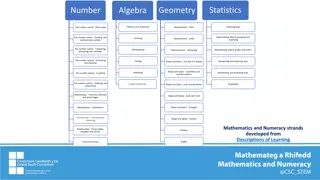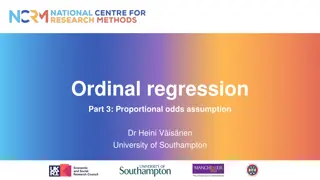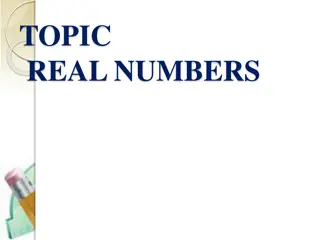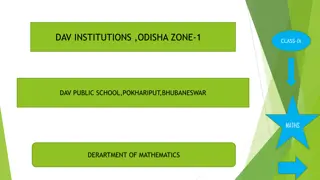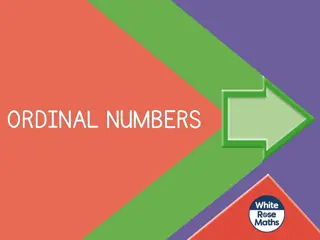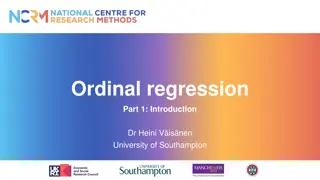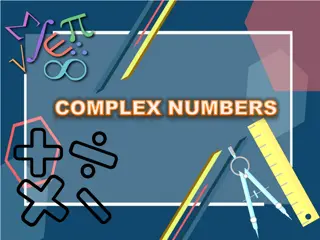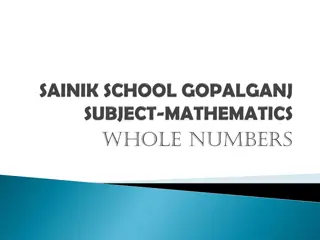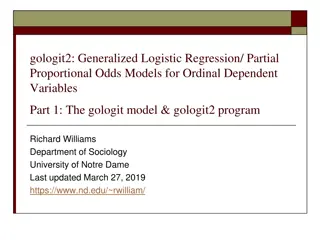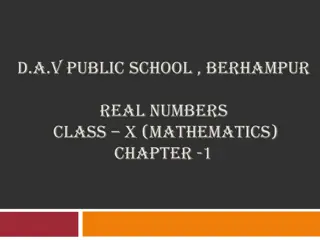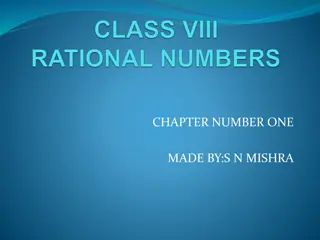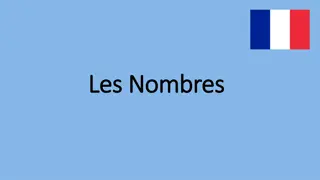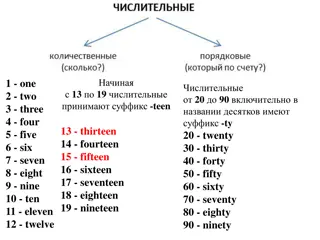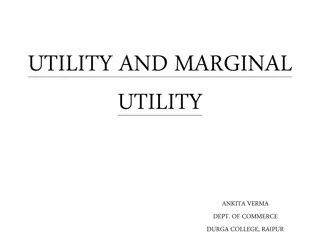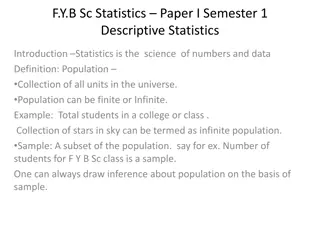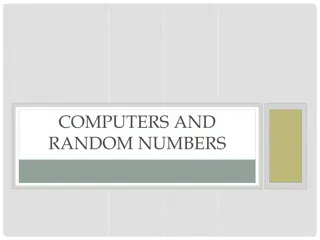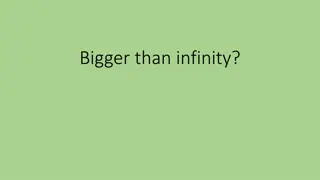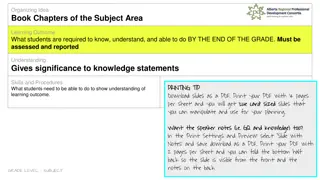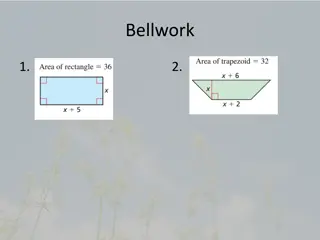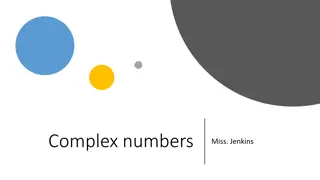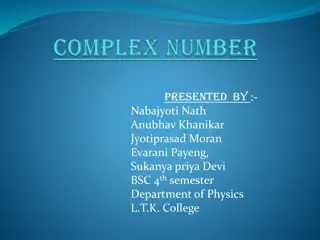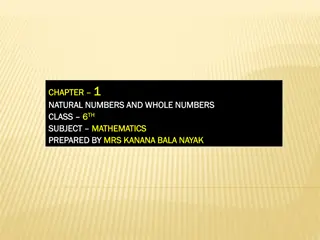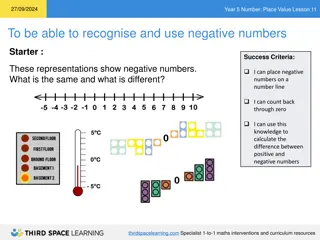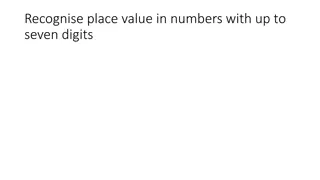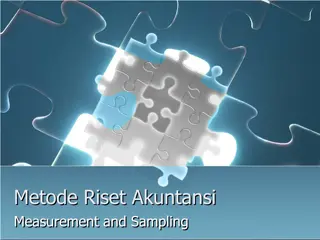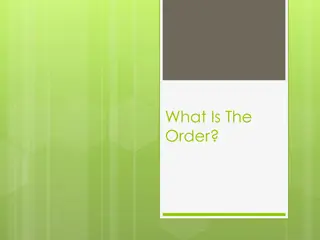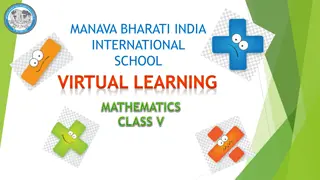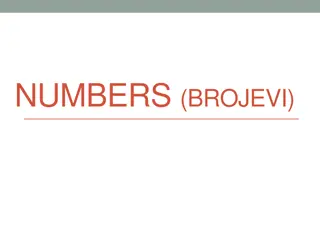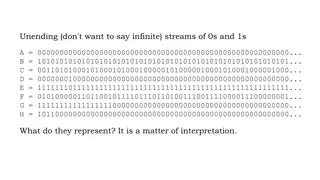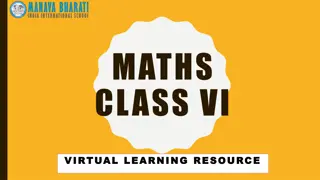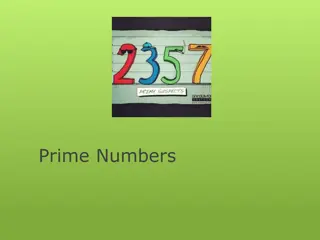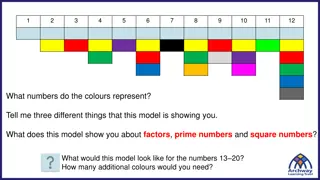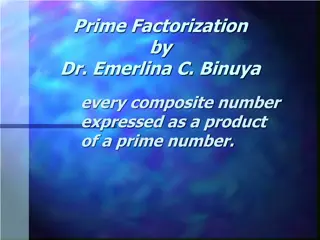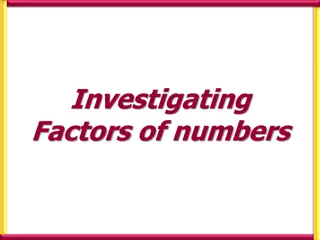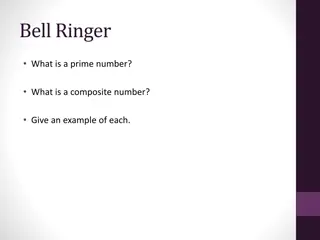RATIONAL NUMBER ARITHMETIC. Day 1: Interpreting Negative Numbers
Explore the concept of negative numbers through practical scenarios such as temperature readings and elevation differences. Learn how to compare rational numbers and describe measurements in relation to sea level, all while engaging in group activities and exercises. Enhance your understanding of ne
1 views • 8 slides
Engaging English Lesson: Who's First in the Race?
In this English lesson, Assistant Teacher Shamsun Nahar Zeba guides Class Four students through learning outcomes focused on recognizing sound differences, pronunciation, and intonation. Through engaging activities like singing songs and discussing a race scenario, students practice new vocabulary a
6 views • 16 slides
Understanding Numbers and Place Value in Mathematics Education
Explore cardinal, ordinal, and nominal numbers with a focus on place value understanding. Learn to read, represent, and interpret numbers up to one million using various representations. Develop skills in rounding, estimation, and problem-solving involving measurements and bounds.
1 views • 36 slides
Understanding Proportional Odds Assumption in Ordinal Regression
Exploring the proportional odds assumption in ordinal regression, this article discusses testing methods, like the parallel lines test, comparing multinomial and ordinal logistic regression models, and when to use each approach. It explains how violating the assumption may lead to using the multinom
0 views • 13 slides
Exploring Real Numbers and Number Systems
Dive into the world of real numbers with topics ranging from the definition of real numbers to Euclid's Division Algorithm and the Fundamental Theorem of Arithmetic. Discover the properties of rational and irrational numbers, learn to find the highest common factor (HCF) and least common multiple (L
0 views • 37 slides
Understanding Rational and Irrational Numbers in Mathematics
Explore the concept of rational and irrational numbers in mathematics through defining, distinguishing, computing, representing, and rationalizing these types of numbers. Learn about natural numbers, whole numbers, integers, rational numbers, and irrational numbers with clear examples. Answer common
1 views • 48 slides
Learning Through Visuals in Education
Explore the use of visual aids in educational scenarios, including activities like counting candles, spelling numbers, and ordering sequences. Engage in learning with ordinal numbers, birthday celebrations, and racing scenarios presented through interactive images.
0 views • 15 slides
Understanding Ordinal Regression in Data Analysis
Introduction to ordinal regression, a powerful tool for analyzing categorical variables with natural ordering. Explore cumulative odds, probabilities, and the proportional odds model. Learn about estimating equations, intercepts, and slopes in ordinal regression models. Discover how higher values of
1 views • 15 slides
Comprehensive Guide to Complex Numbers - Learning Objectives, Key Concepts, and Previous Knowledge Testing
This comprehensive guide provides detailed information on complex numbers, including learning objectives such as identifying complex numbers, applying algebra, understanding properties like conjugates and moduli, finding square roots, and representing in polar form. Key concepts covered include inte
3 views • 27 slides
Understanding Whole Numbers and Basic Properties
Whole numbers are a collection that includes natural numbers and zero. They are denoted by the letter W and start from 0, 1, 2, 3, 4, 5, 6, and so on. The successor of a whole number is obtained by adding 1, and the predecessor is obtained by subtracting 1 (except for 0). The number line begins at 0
2 views • 7 slides
Overview of gologit2: Generalized Logistic Regression Models for Ordinal Dependent Variables
gologit2 is an advanced program for estimating generalized logistic regression models, including proportional odds, generalized ordered logit, and partial proportional odds models. It offers features beyond traditional ologit, allowing for less restrictive and more parsimonious modeling of ordinal d
0 views • 27 slides
Real Numbers: Classification, Operations, and Examples
Real numbers encompass a wide range of mathematical entities, including natural numbers, whole numbers, integers, fractions, rational numbers, and irrational numbers. This chapter delves into the classification of real numbers, Euclid's Division Lemma and Algorithm, finding HCF and LCM using these m
4 views • 15 slides
Understanding Rational Numbers: A Comprehensive Overview
Discover the world of numbers with this comprehensive guide on different types of numbers, focusing on rational numbers. Learn about natural numbers, whole numbers, integers, and how rational numbers are represented on a number line. Dive into the properties of rational numbers and explore the conce
2 views • 19 slides
Learning French Numbers and Patterns
Explore the world of French numbers, from finding missing numbers to understanding the pattern in counting. Discover how the French language uniquely names numbers beyond 60. Dive into the significance of names like "quatre-vingts" and "quatre-vingt-dix" in French numbering. Unravel the mystery behi
0 views • 16 slides
Understanding Prime Numbers and Greatest Common Divisors in Discrete Structures
Cryptography relies on prime numbers and the fundamental theorem of arithmetic to ensure security. We explore the concept of prime numbers, composite numbers, and how to test for primality using trial division. The Fundamental Theorem of Arithmetic establishes that every integer can be uniquely fact
1 views • 44 slides
Playing with Numbers: Words, Definitions, and Calculations
Explore the world of numbers through words, definitions, and calculations. Delve into the quirky nature of number names, understand ordinal positions, and challenge your math skills with addition examples.
0 views • 9 slides
Learning Days of the Week in English for Fourth Graders
Students in fourth grade will learn about the days of the week and ordinal numbers in English through engaging activities like singing songs, looking at pictures, and completing sentences. The lesson aims to enhance students' knowledge and understanding of the concepts in a fun and interactive way.
0 views • 12 slides
Understanding Utility and Marginal Utility in Economics
Utility refers to the satisfaction a consumer receives from consuming commodities. It is a subjective concept that can be measured through cardinal or ordinal approaches. Cardinal approach involves measuring utility numerically, while ordinal approach orders levels of satisfaction based on utility.
0 views • 16 slides
Mastering Numbers in Writing: A Comprehensive Guide
Learn how to effectively use numbers in writing, including when to spell them out and when to use numerals. Discover general rules for formatting numbers in MLA and APA style, as well as guidelines for commas in numbers and dates. With practical examples and clear explanations, this guide will help
0 views • 15 slides
Introduction to Descriptive Statistics in F.Y.B.Sc. Statistics Paper I Semester 1
Statistics is the science of numbers and data, involving populations and samples. Characteristics can be qualitative or quantitative, while variables can be discrete or continuous. Data can be primary or secondary, collected through various methods. Scales of measurement include nominal and ordinal
0 views • 16 slides
Understanding Random Numbers in Computers
Explore the concept of true random numbers versus pseudorandom numbers in computers. Learn how pseudorandom numbers are generated algorithmically but predictable, while true random numbers are derived from physical phenomena like radioactive decay. Discover the relevance of high-entropy pseudorandom
0 views • 57 slides
Exploring Infinity: From Countable Integers to the Unbounded Real Numbers
Delve into the realm of infinity, where the concept transcends our finite understanding. Discover how the set of positive integers, even numbers, all integers, positive rational numbers, and real numbers each showcase a distinct level of infinity. Explore the notion of cardinality, bridging the gap
0 views • 9 slides
Understanding Decimal Numbers and Operations in Mathematics
This educational material focuses on teaching students in a structured manner about decimal numbers and operations within the subject of mathematics. It covers essential topics such as place value, addition, subtraction, prime and composite numbers, and more. Students are required to grasp the signi
0 views • 18 slides
Understanding Complex Numbers in Mathematics
Learn about complex numbers, including real and imaginary parts, operations with complex numbers, the imaginary unit, equality of complex numbers, and finding square roots of negative numbers. Explore how to define and use the imaginary unit, add, subtract, and multiply complex numbers, find complex
0 views • 17 slides
Exploring Complex Numbers in Mathematics
Delve into the world of complex numbers through solving quadratic equations with real coefficients that have complex solutions, extending polynomial identities to include factoring with complex numbers, rewriting expressions, and understanding imaginary numbers. Discover the process of finding compl
0 views • 16 slides
Understanding Complex Numbers and Their Properties
Complex numbers are numbers of the form z = x + iy, where x and y are real numbers and i is the imaginary unit. They play a crucial role in mathematics and physics. This content covers the definition, equality, algebra, geometrical representation, and conjugate of complex numbers with detailed expla
0 views • 11 slides
Understanding Natural Numbers, Whole Numbers, and Roman Numerals
This chapter delves into the concepts of natural numbers, whole numbers, and Roman numerals. It covers the basics of numeral systems, properties of whole numbers, and rules for Roman numerals. Learn about counting numbers, place value, successors, predecessors, and more to build a strong mathematica
0 views • 11 slides
Exploring Negative Numbers in Year 5 Mathematics Lesson
In this Year 5 mathematics lesson on negative numbers, students learn to recognize and use negative numbers through various activities such as placing them on a number line, counting back through zero, and calculating the differences between positive and negative numbers. The lesson also prompts stu
0 views • 23 slides
Understanding Place Value and Number Magnitudes
Explore the concept of place value in numbers up to seven digits, learn how to write numbers in figures, identify digit values, find the largest and smallest numbers, order numbers, and work on rounding and comparisons. Engage in exercises like recognizing digits, writing numbers in figures, circlin
0 views • 61 slides
Understanding Accounting Research Methods: Measurement and Sampling
Measurement is a crucial aspect of research in accounting. It involves assigning numbers to empirical events, objects, or properties. Measurement consists of selecting measurable phenomena, developing mapping rules, and applying these rules appropriately. The process of measurement includes determin
0 views • 63 slides
Getting in Order: Elevator Exercise for Class 11th-30th
In this interactive exercise, a class must line up according to ordinal numbers from 11th to 30th to ensure getting off the elevator on the correct floor. The activity involves teamwork, listening, and matching ordinal words to numbers on index cards. Students learn sequencing in a fun and engaging
0 views • 5 slides
Understanding Numbers and Comparisons in Mathematics
Dive into the world of numbers with a focus on large numbers, digits, and comparisons in mathematics. Explore the significance of digits, learn rules for comparing numbers, and practice examples to enhance your understanding. Master the art of determining the smallest and greatest numbers based on t
0 views • 13 slides
Understanding Numbers and Notation in English
Explore the nuances of representing numbers in English, including fractions, decimals, noughts, telephone numbers, cardinal versus ordinal numbers, and the use of "and" in British English. Dive into the significance of punctuation when writing large numbers.
0 views • 11 slides
Understanding Binary Numbers and Their Representation in Mathematics
Explore the world of binary numbers through a series of infinite 0s and 1s, representing integers and real numbers between 0 and 1. Dive into the interpretation of these binary sequences as natural numbers, integers, and fractions, shedding light on the concepts of trans-finite numbers and their pla
0 views • 16 slides
Exploring Mathematics: Class VI Syllabus Overview & Number Concepts
Delve into the Class VI mathematics syllabus, covering topics such as Knowing our Numbers, Basic Geometrical Ideas, Natural Numbers, and more. Explore the Hindu-Arabic system of numeration, ordering numbers, counting large numbers, and the significance of natural numbers in counting and ordering. En
0 views • 15 slides
Understanding Prime Numbers
Exploring the concept of prime numbers and how to identify them between 1 and 100. The process involves recognizing that prime numbers have only two factors - 1 and themselves. The visual representations help in shading non-prime numbers and multiples of 2, 3, and 5. By following the rules outlined,
0 views • 31 slides
Exploring Numbers with Eratosthenes' Sieve and Prime Factorization
Eratosthenes, a Greek scholar, developed the Sieve of Eratosthenes to find prime numbers and made significant contributions to mathematics and astronomy. The model shown highlights factors, prime numbers, and square numbers, providing insights into number properties and their relationships. It demon
1 views • 14 slides
Understanding Prime Factorization for Prime and Composite Numbers
Learn about prime and composite numbers, prime factorization, and how to identify them using examples. Discover the concept of factors, prime numbers, composite numbers, and prime factors through this educational presentation. Explore how every composite number can be expressed as a product of prime
1 views • 8 slides
Exploring Factors and Prime Numbers in Mathematics
Delve into the concept of factors and prime numbers through an investigation of various numerical values. Understand the distinction between prime numbers and composite numbers, identify prime factors of a number, and explore the significance of prime numbers in mathematics.
0 views • 4 slides
Understanding Prime and Composite Numbers with GCF
Explore the concepts of prime and composite numbers, the difference between them, and how to find the Greatest Common Factor (GCF). Prime numbers have only two factors, 1 and the number itself, like 2, 3, 5. Composite numbers have more than two factors, such as 4, 6, 8. Learn to identify prime and c
0 views • 12 slides


